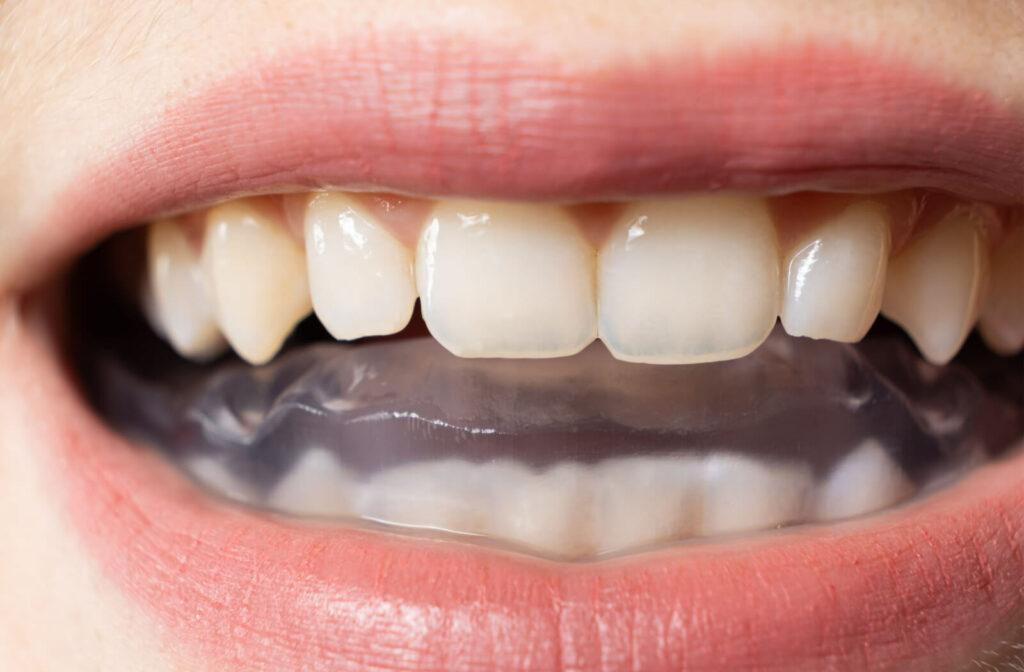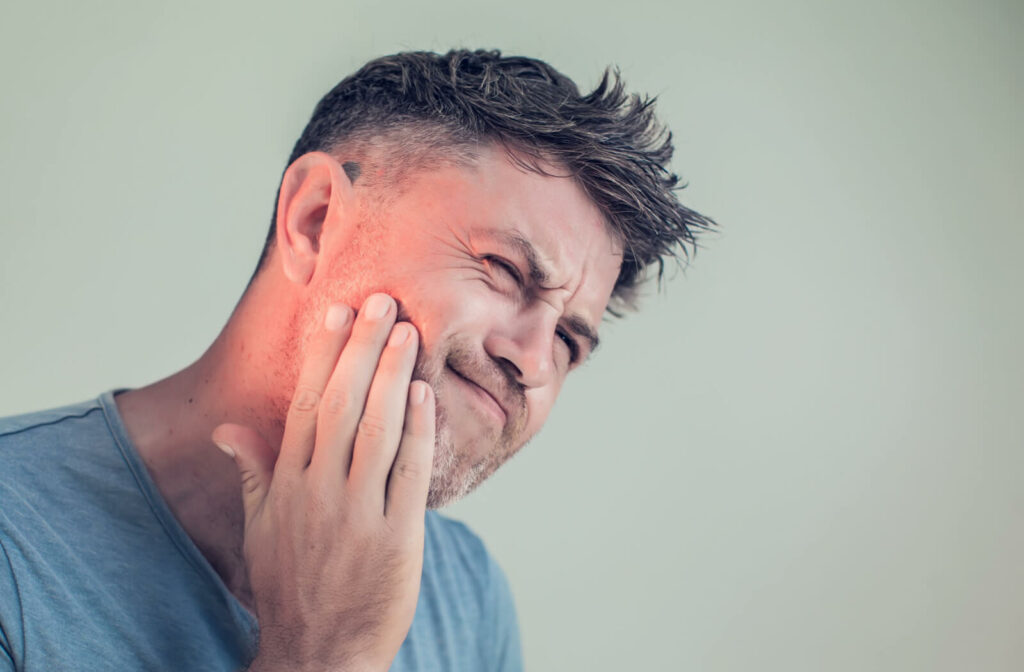The temporomandibular joint, or TMJ, is the joint where your lower jaw connects to your skull. It controls how you chew, how to speak, and how your jaw moves in general.
Temporomandibular disorders, also known as TMJ or TMD, are a group of several different conditions that can cause pain, discomfort, or irritation in the jaw joint and surrounding muscles. Many people use the acronym TMD to avoid confusing the joint with the conditions that cause problems in the same area. But can TMD cause tooth pain?
TMD pain can cause toothaches, but it’s different from what people normally feel when it comes to tooth pain. Because the TMJ is located near so many different muscles, nerve endings, ligaments, and more, pain in the joint can often radiate out and cause what’s called “referred pain.” This can make it difficult to tell whether you’re dealing with tooth and face pain from your teeth themselves or TMJ pain.
One of the more common ways to treat TMD pain is to use a special mouthguard for when you sleep. These mouthguards stop you from clenching your jaw too tightly or grinding your teeth, which gives the joint and surrounding area time to heal.
The best way to deal with toothaches or TMD is to speak with a dentist as soon as you can. Schedule an appointment with Hometown Dental today in the Calgary area to speak with a trustworthy professional and find the cause of your tooth pain today.
What Causes TMD or TMJ pain?
The causes of TMD are different from person to person—there’s no one-size-fits-all answer for the pain.
Most often, the pain is caused by a person grinding their teeth. When stressed, many people will grind their teeth together or rotate their jaw without realizing it. Sometimes TMD can be caused by poorly fitting dentures or implants. Other common causes even include arthritis, jaw injuries, nail biting, and general stress.
What Does TMJ Tooth Pain Feel Like?
If the pain is severe, it can feel like the pain is in your teeth themselves. This is because of how many muscles, nerves, and moving parts are located in the area near the jaw. If there’s inflammation or pain anywhere in this area, it can often feel like it’s located anywhere between your ear and your teeth.
The best way to determine whether or not this pain is actually coming from your teeth is to see a dentist as soon as possible. However, if you examine your own mouth, you can check for inflammation, redness, bleeding, or any swollen parts near your teeth. This can help you narrow down exactly where the pain is located.

How to Treat TMD Pain
TMD can naturally go away as the jaw heals itself, but there are a number of things you can do to help deal with the symptoms, such as:
- Use a cold, damp cloth or compress on the area that hurts
- Avoid hard or harsh foods while your jaw heals
- Avoid opening your mouth too wide
- Consciously try to relax your jaw muscles as often as possible
- Wear a mouthguard when sleeping
Mouthguards are becoming a more popular way to deal with pain caused by TMD. They’re normally made of an acrylic material that prevents you from grinding your teeth or putting too much pressure on your jaw when you’re asleep. If you subconsciously go to grind your teeth while you’re sleeping, you’ll instead be grinding your teeth on the acrylic, preventing wear and tear to the enamel of your teeth.
At Hometown Dental, we’ll take a record of your teeth and an digital 3D scan of your jaw’s natural bite to design a custom acrylic appliance. Once we have the scan, we will fabricate it with one of our 3D printers and send it to a special lab to produce a customized mouthguard designed to fit your jaw perfectly. This creates a high-quality mouthguard that fits better than most common boil-and-bite guards purchased elsewhere.
Are TMDs Serious?
While TMD pain can be frustrating to deal with, it’s more common than most people think. Surgery is very rarely needed to stop TMD pain, and the most common treatments include mouthguards or relaxation techniques designed to reduce the pain in your jaw. Your dentist will most likely take an X-ray of your jaw to see what’s causing pain in the area and help you devise a plan to help reduce or prevent the pain.
We’re Here to Help
If you’re dealing with pain in your teeth or jaw, book an appointment with Hometown Dental today to speak with one of our welcoming team members. Your oral health is as important to us as it is to you!





